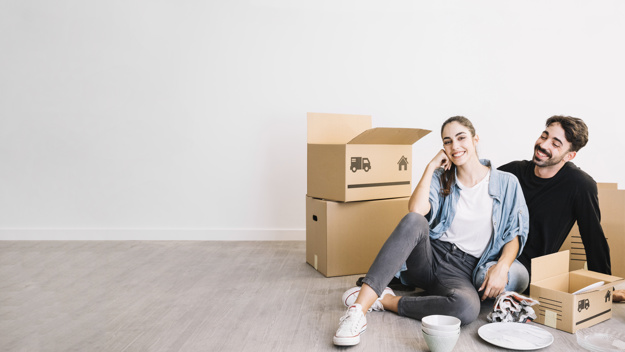5 things to remember when moving house
Moving home can often end up being far more stressful than you’d like. In fact, surveys show that people think moving house can be more stressful than starting a new job, or even a relationship breakdown or divorce. However, the excitement of getting settled into your new abode also rates near the top of the lists of the most exciting times in people’s lives. All in all, moving house is a rollercoaster of emotions.
It’s understandable that if moving home is on the horizon for you, you have a mixture of excitement and fear going on. There’s so much to worry about and get sorted, it can feel totally overwhelming at times. On top of the negotiations on price, the all-important paperwork and letting everyone know you’re on the move, there’s the packing, finding movers and the dreaded clearing up. But don’t panic, everyone feels the same at some point or another. And there’s help at hand. Waste clearance Fife, the experts on clearing out your clutter, can help you get sorted in no time at all with these simple, expert-approved tips on what to remember when moving home, and how to keep sane throughout the process!
Five things to remember when moving house:
1.Label Boxes
First and foremost, you need to work out a system for labeling all your packed belongings. You need to mark the boxes according to which room the items in the box were previously stored, or where they’re going in the new house. Small things like labelling can be easily forgotten, especially when you are rushing. But it will make your life so much easier in the long run, as it will help when you come to unload the items from the box at the other end and if you need to find something in an emergency in the meantime, you don’t have to trawl through every box to find it.
Labelling also helps to keep the things inside the box safe. Cardboard boxes containing fragile items should be marked so. And make sure you put the label on each side of the box and the lid so that there’s no chance of anyone not spotting that it needs to be moved with care. Similarly, any box that contains items that can be easily crushed should be marked with ‘not to have items stacked on top’ signs. You should also label boxes that contain items that must never go below, or above, a certain temperature such as electrical equipment and of course food, with care labels. Some storage units can become very cold overnight, and anything that’s left in a vehicle or in direct sunlight can become very hot, so it’s important to label these items carefully.
You can also put together all the priority items – the things you will need as soon as you get into the new place – and mark with priority labels so that you can unpack those items first. Labelling will also help you in unpacking items at your own pace without cluttering up your new home.
2. Use Correct Packaging Materials
When moving home, you always run the risk of damaging something in the moving process, therefore it’s essential to choose the right packaging materials. Not using the correct materials can lead to big issues. You must use sturdy boxes that are strong enough to hold the contents and strong enough to withstand being stacked. Weak boxes can easily collapse under the weight, or break underneath when picked up if the contents are too heavy for the box. The packaging you choose must match the items you are storing. If the items are bulky but fragile, the box needs to be sturdy enough to easily house them without damaging them and large enough that they won’t get crushed. And of course everything that is fragile must be wrapped in sufficient bubble wrapping or tissue paper to ensure it doesn’t get smashed.
Refrain from using big bags for storing your essentials as the bags can tear open, leaving your items scattered, or worse, damaged and broken. You need packaging that seals appropriately to ensure that the items inside remain safe. A secure closing is important as moving in bad weather or transporting in a truck makes your items vulnerable to the elements if left at all exposed.
Make sure you have enough boxes and packaging materials to do the job. You don’t want to have to make a second, third, or fourth trip to your old place to bring back all the items. Having enough boxes will ensure that you can move all your home essentials in one go. However, it is also crucial that you don’t overfill the boxes. This can also damage your treasures.
3. Consider Using a Removal Company
Whilst moving your home essentials all by yourself seems easy at first glance, it is emotionally stressful, physically challenging, and extremely time-consuming in reality, especially when you have a family and a whole lot of stuff to move. A removal company can help you plan everything ahead, from packaging to loading and unloading. This could not only save you a lot of time but also reduce the risk of damage and take away most of the stress. A reputable moving company will only employ professionals who are trained to carry out the entire process without damaging any of your possessions. Therefore, your belongings will be delivered safely to your new place. Using a removal company is cost-effective as well, as doing the job yourself might seem a good way to save money on the surface of things, but it can often work out surprisingly expensive when you factor in van hire, petrol, storage, packaging and all the time it takes you. Ask around for the companies with the best reputations, get quotes and book early to avoid disappointment. Consider visiting Shiply and search the truck load board to find best shipping companies providing service in your area.
4. Giveaway or Throw Away Unwanted Stuff
If you think that you have items in your possession that are of no use when you move in to your new space, get rid of them now. This will not only lower the burden when it comes to the packing but will also make moving a lot easier and cheaper. You need to decide what you want to keep and what can be thrown, sold or given away. Be ruthless and give the job to waste clearance Fife experts if you’re struggling with the decluttering.
5. Carry Important Documents Separately
Documents including passports, school records, birth certificates, bank records and bills need to be stored separately in a file and kept with you. You would not want to misplace any of your important documents during the move
No matter how much planning you do, something will inevitably not go to plan with a home move. However, careful preparation will save you a huge amount of stress and countless disasters too!

